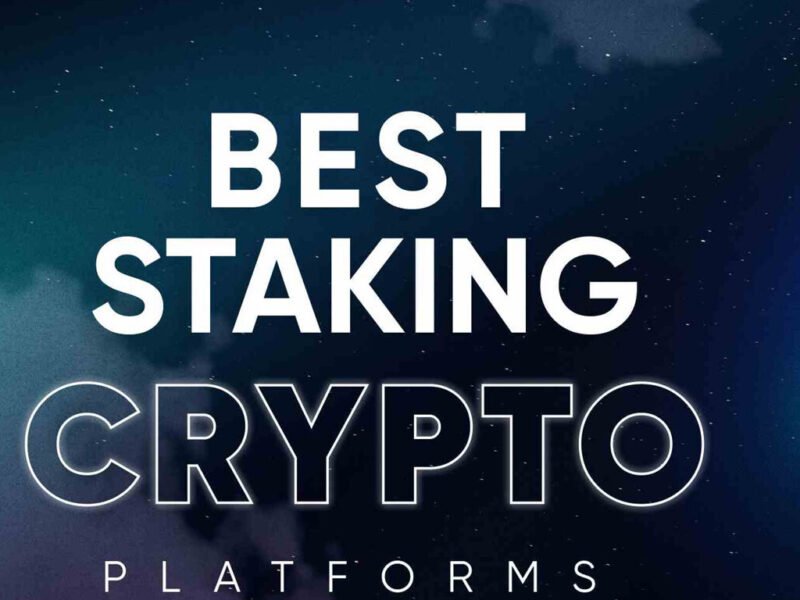Outline
- Introduction
- What is DeFi?
- Quick Overview of ETH 2.0
- Why DeFi Staking Platforms Are Game-Changers
- Understanding DeFi Staking
- Definition and Purpose
- Difference Between Traditional Staking and DeFi Staking Platforms
- Benefits of Staking ETH on DeFi Staking Platforms
- How ETH 2.0 Changes the Game
- Ethereum’s Shift from PoW to PoS
- Role of Validators and Staking
- Impact on Investors and Network Security
- What to Look for in a Good DeFi Staking Platform
- Security Protocols
- User Interface and Accessibility
- Reward Structure and APY
- Gas Fees and Hidden Charges
- Platform Reputation and Governance
- Top 5 Best DeFi Staking Platforms for ETH 2.0
- Lido Finance
- Features
- Pros & Cons
- Link
- Rocket Pool
- Features
- Pros & Cons
- Link
- Binance DeFi Staking
- Features
- Pros & Cons
- Link
- StakeWise
- Features
- Pros & Cons
- Link
- Kraken ETH Staking (Hybrid Model)
- Features
- Pros & Cons
- Link
- Lido Finance
- Comparison Table of DeFi Staking Platforms
- Security Considerations in DeFi Staking
- Smart Contract Risks
- Rug Pulls & Exit Scams
- Platform Audits and Insurance
- Maximizing Your ETH Staking Rewards
- Compounding Strategy
- Diversification Across Platforms
- Watching the APR/APY Metrics
- Common Mistakes to Avoid
- Not Checking Withdrawal Periods
- Falling for Unsustainable APYs
- Ignoring Platform Reputation
- The Future of DeFi Staking Platforms
- ETH 2.0 Full Launch Outlook
- Liquid Staking and Derivatives
- Integration with Layer 2
- Conclusion
- FAQs
- What is the minimum ETH needed to stake?
- Can I lose money staking ETH on DeFi platforms?
- What is the difference between DeFi and centralized staking?
- Is staking taxable?
- Which platform is best for beginners?
5 Best DeFi Staking Platforms for ETH 2.0
Introduction
We’re officially in the era of Ethereum 2.0, and with it comes a gold rush of opportunities—especially for anyone interested in DeFi Staking Platforms. If you’re holding ETH and it’s just chilling in your wallet, you’re basically leaving money on the table.
ETH 2.0 is here to reshape the blockchain landscape with Proof of Stake, and DeFi staking platforms are the gateway for everyday users to become a part of that future. But not all platforms are created equal. Some offer insane rewards. Others? Well, they just look good on the outside.
Let’s break it all down, shall we?
Understanding DeFi Staking
What Is DeFi Staking?
Imagine you had a savings account that didn’t rely on a bank, didn’t need a manager, and still paid you interest—automatically, every single day. Sounds futuristic, right? Well, that’s exactly what DeFi staking platforms bring to the table.
At its core, DeFi staking is the process of locking up your Ethereum (or other proof-of-stake tokens) into a decentralized protocol to support the network’s operations—such as validating transactions and securing the blockchain. In return, you earn rewards in the form of more crypto, usually distributed daily or periodically, depending on the platform.
Here’s where it gets cool: Unlike traditional financial systems where intermediaries (like banks) control your funds and take a cut, DeFi staking is run by smart contracts—self-executing pieces of code that operate on the blockchain. No one touches your funds. No permission is needed. And everything is visible on the public ledger, which means full transparency.
Let’s break that down:
- Decentralized – There’s no single entity controlling the staking pool. Instead, it’s managed by code and governed by the community.
- Permissionless – Anyone with a wallet and internet connection can stake. No paperwork. No KYC. No gatekeepers.
- Transparent – You can verify every transaction and reward distribution on the blockchain, making fraud nearly impossible.
Now here’s why DeFi staking platforms are such a big deal, especially with ETH 2.0: Not everyone can meet Ethereum’s strict requirement of staking 32 ETH and running a validator node. It’s technical, costly, and time-consuming.
DeFi staking solves that. Platforms like Lido, Rocket Pool, and StakeWise pool your ETH with others, letting you stake even as little as 0.01 ETH. They handle the validator side of things, while you sit back and collect rewards. Some even offer liquid staking, which means you get a tokenized version of your staked ETH (like stETH or rETH) that you can use elsewhere in DeFi while still earning rewards.
So instead of locking your ETH away like traditional staking, DeFi lets you earn, trade, and use your staked assets across the ecosystem. It’s like earning interest on your savings while still being able to spend your money—double win!
In short, DeFi staking platforms are opening the door to financial freedom and blockchain participation in a way that’s never been seen before.
How It Differs from Traditional Staking
Traditional staking often requires technical know-how—like running a validator node. DeFi staking platforms, on the other hand, do the heavy lifting for you. You stake through them, and they manage the validation process.
Benefits of DeFi Staking Platforms
- No 32 ETH minimum to run a validator
- Liquid staking (get tokens like stETH in return)
- Earn passive income while supporting Ethereum
- Flexibility in staking/unstaking
How ETH 2.0 Changes the Game
Ethereum’s shift to Proof of Stake (PoS) is like upgrading from a bicycle to a Tesla. The network is now more energy-efficient, scalable, and secure.
Validators replace miners. To become one, you stake ETH—and DeFi staking platforms allow you to do this without needing the full 32 ETH minimum.
This democratizes access to staking rewards while bolstering the Ethereum ecosystem.
What to Look for in DeFi Staking Platforms
Before you dump your ETH into just any pool, here’s your checklist:
1. Security
A top-tier DeFi staking platform will have third-party audits, bug bounties, and a solid reputation.
2. Ease of Use
No one wants a clunky interface. The platform should be beginner-friendly.
3. APY and Reward Transparency
Look beyond flashy numbers. Are the yields sustainable?
4. Fees
Gas fees, staking fees, performance fees—all matter.
5. Reputation
Are they active in the community? Backed by solid projects?
Top 5 Best DeFi Staking Platforms for ETH 2.0
Let’s dive into the best DeFi staking platforms dominating the ETH 2.0 game.
1. Lido Finance
Lido is the king of liquid staking. You stake ETH and receive stETH—a token that reflects your stake and accrues rewards.
Pros
- Liquid staking
- Widely trusted
- Deep liquidity on DEXs
Cons
- Centralization risks
- Smart contract exposure
2. Rocket Pool
A decentralized alternative that puts community and trust at the center. Stake as little as 0.01 ETH.
Pros
- True decentralization
- Low staking threshold
- rETH token for liquidity
Cons
- Slightly lower APYs than Lido
- Smaller network size
3. Binance DeFi Staking
Binance offers ETH 2.0 staking with no validator setup. Though centralized, it’s super easy for beginners.
Pros
- No minimums
- Beginner-friendly
- Integrated with Binance wallet
Cons
- Centralized risk
- Locked staking with limited liquidity
4. StakeWise
StakeWise offers dual-token liquid staking: sETH2 (staked) and rETH2 (rewards). You can also join a staking pool.
Pros
- Transparent reward tracking
- DAO governance
- High APY potential
Cons
- Interface can be overwhelming
- Still gaining adoption
5. Kraken ETH Staking
While Kraken isn’t 100% DeFi, it bridges the gap beautifully. Their ETH staking service is reliable and beginner-friendly.
Pros
- Trusted exchange
- Simple interface
- Good for fiat onramps
Cons
- Centralized
- No tokenized staking assets
Read Also: How to Trade Altcoins Like a Pro on Binance – Best Beginner’s Blueprint
Comparison Table: ETH 2.0 DeFi Staking Platforms
| Platform | APY (%) | Min Stake | Liquidity Token | Centralized? | Link |
|---|---|---|---|---|---|
| Lido Finance | ~4.3 | No Min | stETH | No | lido.fi |
| Rocket Pool | ~3.9 | 0.01 ETH | rETH | No | rocketpool.net |
| Binance | ~4.0 | No Min | BETH | Yes | binance.com |
| StakeWise | ~4.1 | No Min | sETH2/rETH2 | No | stakewise.io |
| Kraken | ~4.0 | No Min | None | Yes | kraken.com |
Security Considerations for DeFi Staking
Even the best DeFi staking platforms come with risks. Don’t stake blind.
- Smart Contracts: Always check for audit reports.
- Insurance: Some platforms partner with Nexus Mutual or others.
- Reputation: Follow community discussions and Reddit threads.
Maximizing Rewards on DeFi Staking Platforms
Want to squeeze the most from your staked ETH?
- Compound returns by reinvesting.
- Spread across platforms to reduce risk.
- Watch APYs regularly—some change dynamically.
Common Mistakes to Avoid
- Jumping into platforms with no audits.
- Getting lured by unsustainable APYs (like 15%+).
- Not understanding lock-up terms or withdrawal delays.
Future of DeFi Staking Platforms
DeFi staking is just getting warmed up.
- Liquid staking will evolve to include multiple chains.
- Derivatives (like stETH, rETH) could be collateralized.
- Integration with L2s (like Arbitrum, zkSync) will reduce gas fees and improve speed.
Conclusion
If you’re bullish on Ethereum, DeFi staking platforms offer a hands-free way to earn while holding. Whether you’re all-in on decentralization (Rocket Pool) or prefer simplicity (Binance), there’s a perfect option out there for you.
Just remember—do your homework, never invest blindly, and treat staking like a long-term commitment. The future of ETH is proof-of-stake, and you can be part of securing it.
Read Also: The 7 Best Crypto Credit Cards With Cashback Rewards in Bitcoin
FAQs
1. What is the minimum ETH needed to stake?
With DeFi staking platforms like Rocket Pool and Lido, you can stake as little as 0.01 ETH.
2. Can I lose money staking ETH on DeFi platforms?
Yes. Risks include smart contract bugs, platform hacks, or slashing (on validator misbehavior). Always choose audited platforms.
3. What is the difference between DeFi and centralized staking?
DeFi staking is trustless and transparent. Centralized staking involves handing over your funds to a third-party service.
4. Is staking taxable?
Yes. In most jurisdictions, staking rewards are treated as income. Always consult a tax advisor.
5. Which platform is best for beginners?
Binance or Kraken are easiest to start with. But if you prefer decentralized options, Lido is your best bet.







